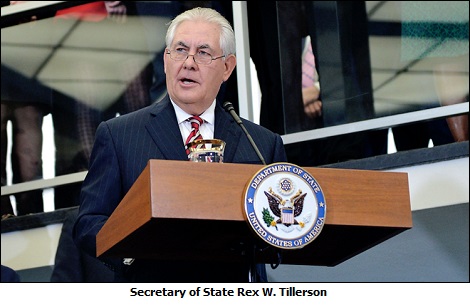
|
|

|
|
| April 18, 2024 |
|
US State Department memos shed light on 'extreme vetting' for visas 
The U.S. State Department has asked American embassies and consulates around the world to identify certain groups that should get extra scrutiny when they apply for visas.
A series of directives also instructs U.S. diplomatic posts overseas to review the social media accounts of visa applicants who are suspected of terrorist ties or of having been in Islamic State group-controlled areas. The diplomatic cables sent by Secretary of State Rex Tillerson directed embassies to convene security and intelligence working groups to determine criteria for "population sets" that would warrant increased scrutiny before traveling to the U.S. Even if the applicant otherwise qualifies for a visa, those identified as meeting the criteria would require additional scrutiny, leading to a possible visa denial. It is the first evidence of a plan for the "extreme vetting" of foreigners entering the United States that President Donald Trump promised during his campaign. The four cables sent between March 10 and March 17 do not define which groups would be considered among the "population sets" requiring more scrutiny. Social media accounts But in the first glimpse into what "extreme vetting" may look like under the Trump administration, one of Tillerson's memos would have added to the interview process questions about an applicant's workplaces, employers, addresses and travel history going back 15 years, as well as all email addresses and social media handles used in the last five years. The questions were withdrawn in a following memo, pending approval of the list by another federal agency. The directives, first reported by Reuters, quickly drew criticism from rights groups and others who've accused Trump of discriminating against Muslims through his now-suspended ban on travelers from six predominantly Muslim countries, Iran, Libya, Somalia, Sudan, Syria and Yemen. Discrimination? "These measures could provide license for discrimination based on national origin and religion,'' human rights group Amnesty International wrote in a letter to Tillerson on Thursday. "They could provide a pretext for barring individuals based on their nonviolent beliefs and expression. Social media checks, as well as demands for social media passwords at U.S. borders, have significant implications for privacy and freedom of expression.'' Anil Kalhan, a law professor who chairs the international human rights committee of the New York City Bar Association, added that the directives "will needlessly worsen visa processing backlogs" and may lead to unwarranted visa denials. Critics of Trump's calls for "extreme vetting," including refugee officials and State Department staffers, have said the process for visa processing is already stringent. "We have a terrorist watch database. We have known immigration violators database. We have a criminal background check database that they have to go through. They don't just take the visa applicant's word," Stephen W. Yale-Loehr, an immigration law professor at Cornell University's law school, told CBS News last month. "They do go through all of these computer databases to verify for themselves that it's appropriate to issue the visa to a particular individual," he said. A State Department official refused to comment when asked about the recent memos by VOA. He said only that the agency "immediately took steps to further strengthen our already strong screening and vetting procedures" after the travel-related executive order issued March 6, which has been suspended in part by federal courts. (Source: VOA News) Story Date: March 25, 2017
|